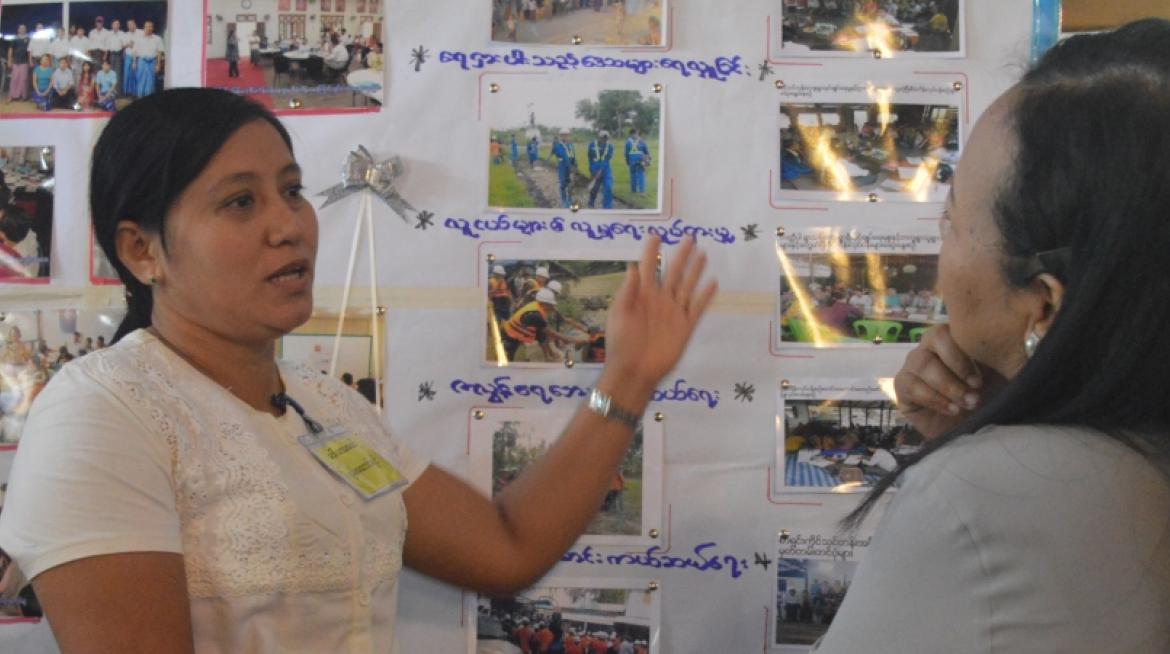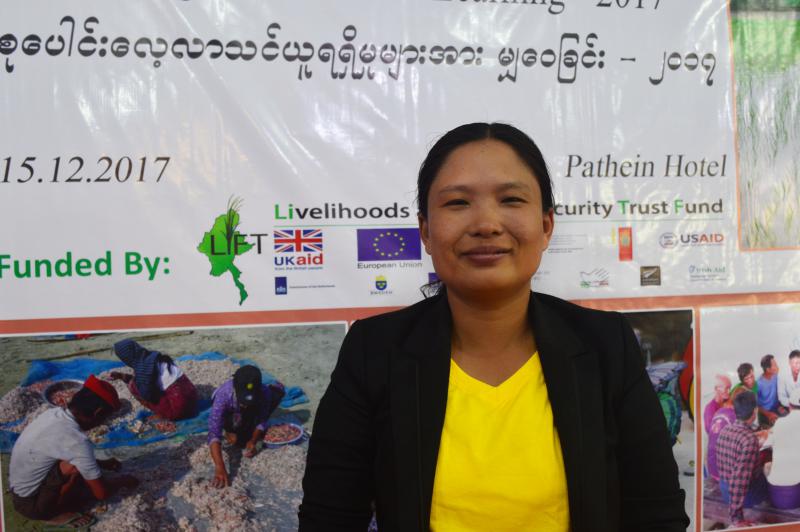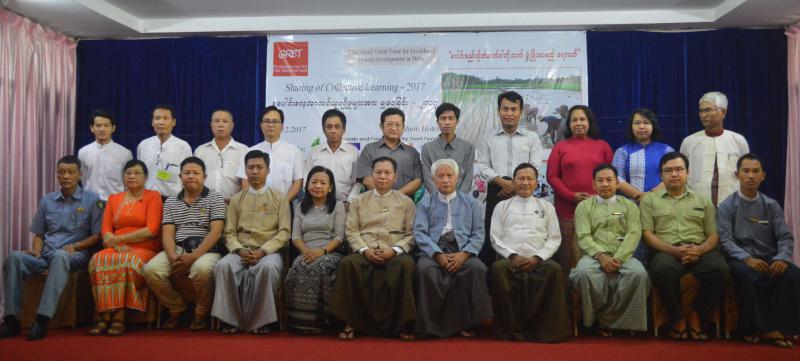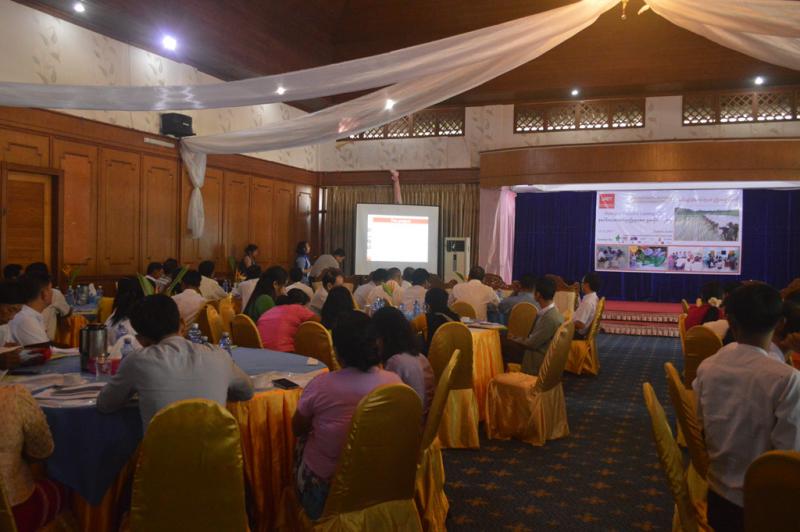
As the room lit up with applause, Ma Win Mar Htwe could not help but feel nervous. Unused to speaking in front of large crowds, she had been quietly motivating herself saying, “I’ll be alright, keep calm.” As the founder of Pan Pyo Thu, a local women’s empowerment civil society organisation (CSO) based in Pathein, she was about to present to an audience of over a hundred attendees including representatives from the Ayeyerwady regional government. It turns out she had no need to worry; much like the organization itself, the presentation was a success.
On 15th December, LIFT partner GRET organised a Sharing of Collective Learning Event for local CSOs like Pan Pyo Thu, who have been participating in its LIFT-funded small grants project. About 50 local CSOs joined the Pathein event, travelling from Pyapon, Labutta, Pathein, Bogale, Kyaiklat, Pantanaw, Dedaye and Mawlamyinegyun.
Speaking at the opening, Director of the Ayeyerwady Department of Agriculture U Tun Aung Kyaw said the regional government and CSOs have a history of strong collaboration since Cyclone Nargis in 2008. CSOs are reaching needy communities more and more through work in the field. He appreciates their assistance and believes that with continuous momentum, sustainable development is achievable. He said that although development aid is helping to bring people out of poverty, beneficiary communities also need to change their mind sets to be responsible with the assistance they receive. CSOs will play a big role in this change.
GRET is implementing the LIFT-funded small grants programme in the Ayeyarwady Region covering eight townships. The project started in the Delta in early 2017 with the aim of strengthening civil societies active in the livelihoods sector. By building capacities of the local civil society organisations through a special funding window of small grants, the project’s purpose is to improve income and resilience in Delta communities. By strengthening the whole livelihood system where civil society, the private sector and local authorities can work together hand-in-hand, the project also seeks to enhance pro-poor policies.
In her opening remarks Daw Myint Su, GRET’s Country Representative, pressed the need for a local pool of experts for the sustainability of CSOs in Myanmar. As international projects will be phased in time, at the end of the day only local organisations can truly lead the country’s development process. She said that the small grants project for CSOs was trying to fulfil this need with capacity building initiatives including proposal writing and fund management. From assessing and mapping active CSOs in townships to approving qualified proposals, there is much development work and good learning experiences for GRET and CSOs to move forward.
Ma Win Mar Htwe explained this experience in her presentation. “Traditionally, Pan Pyo Thu worked as charity-based or philanthropic organisation so we had never heard terms like ‘proposals’ and ‘projects’. As a result, we did not have a development mind set,” she said. “After the training we received from GRET, we have now come to understand it well.”

Ma Win is a promising leader who has been active in women’s empowerment activities since 2007. After she established the women’s empowerment organisation Pan Pyo Thu (which means flower gardener or florist), it was officially registered in 2015. The number of women’s organisations is very limited at the township and regional level in Ayeyarwady Region. Pan Pyo Thu, representing the voice of women in Pathein District, is an exception. During the recent 16 Days of Activism campaign*, Pan Pyo Thu was the focal organisation in Pathein supporting field work and liaising with the local government.
“We now have five groups under our organisation and we give mentorship to them. That’s how we multiply and share the capacity building training that we received from GRET,” said Ma Win. “Once we received the project grant, we distributed the money to women’s self-help groups in three village tracts for duck breeding. Thanks to the grant, these women now have a steady daily income from selling duck eggs; in some areas they can sell around 30 eggs per day. We feel very pleased for them”. Pan Pyo Thu also plans to develop trainings in small savings and book keeping practices for communities to improve basic financial literacy.
As of mid-December 2017, GRET is in the final stages of its CSO mapping exercise with only the three townships of Pantanaw, Mawlamyinegyun and Dedye remaining. Supported by LIFT, it has completed contracts with 14 CSOs including Pan Pyo Thu, and has accepted 34 proposals. So far, in four out of the eight townships covered by the project in Ayeyerwady Region, 53 CSOs have been enlisted. Core members of these CSOs have successfully undertaken capacity building such as proposal development training. Training is provided on a demand-driven basis, so CSOs can choose to enhance whichever skills they need in managing projects.

GRET reaches out to these local organisations through advocacy and mass consultation workshops in townships that include CSOs, private sector bodies and local government representatives. Then, the CSO township representatives are elected as township working group (TWG) members. The small grants fund is divided into two categories – project and special. The project category runs for a minimum of six months. The proposed projects are diverse, and all are demand-driven based on community needs. The special grant category takes a maximum of six months and so far these projects are mainly about assessment, research and advocacy workshops. The grant-making process is a responsibility of the TWG, so its members can learn and build up their capacity throughout the process.
Ma Moe Moe Khine, Senior Fund Coordinator for GRET, spoke about the impact of projects under the funding. “For example, a project in Pathein that produces handicrafts made with coconut shells is progressing well in terms of building up local capacity,” she said. “Beaches like Ngwe Saung and Chaung Tha have an increasing number of visitors year by year; this project can expect a good local market. This CSO is now linking with a local business to teach the local community skills, especially in creating modern art work.”
LIFT opened the small grants funding window for livelihood system strengthening, targeting township-level CSOs, in 2016. This initiative was developed based on the findings and recommendations of the Supporting civil society with LIFT funds study released in mid-2015. Though LIFT had been partnering with CSOs since its commencement in 2009, the study highlighted that the funding windows of LIFT’s prioritised geographic zones, if unchanged, would not have been able to fulfil LIFT’s strategic outcomes for civil society development. To remedy this, LIFT started strategic partnerships with local NGOs as recommended in the study to fulfil the unmet needs of CSOs in LIFT-funded programmes. LIFT partners with SWISSAID for its Uplands programme, GRET for its Delta programme and Pact for its Dry Zone programme for managing the small grants window. As of the end of 2016, LIFT is supporting local entities (including CSOs and the private sector) with 39 per cent of its total funding. Learn more about LIFT’s work with civil society in the LIFT Annual Report 2016.
*The 16 Days of Activism is a global campaign for women’s empowerment led by UN Women.



